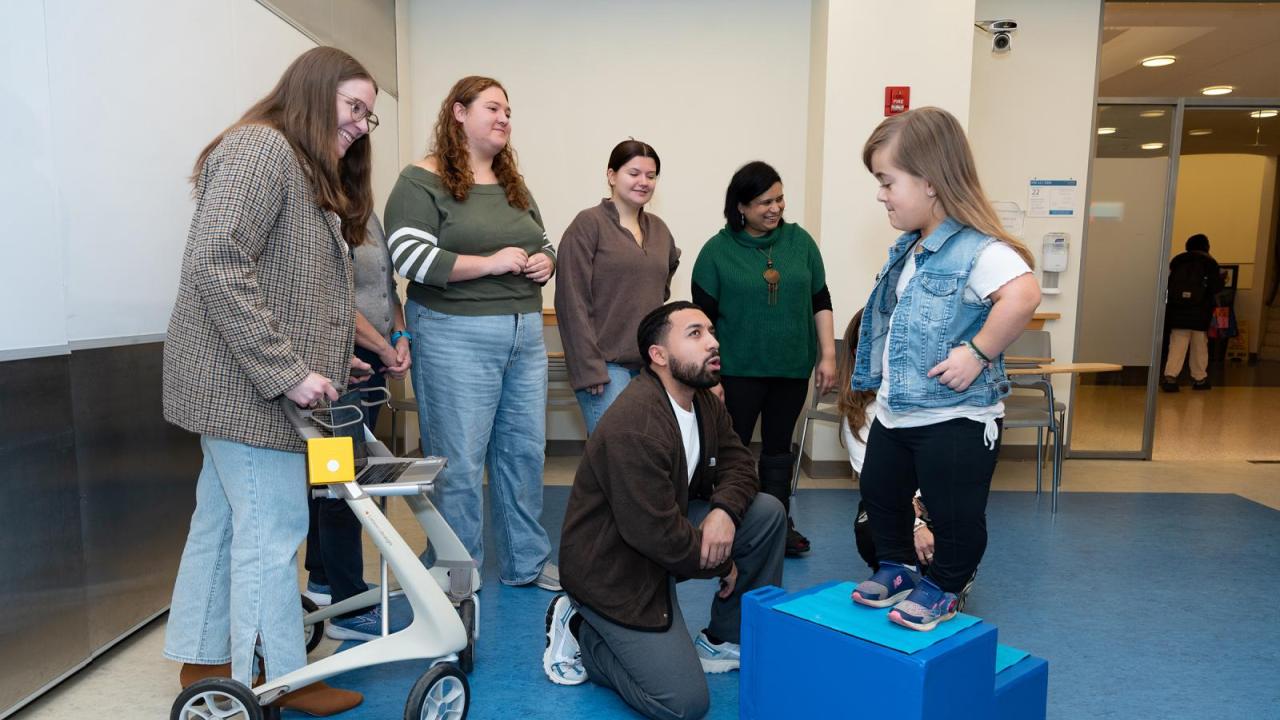One of Faith Slump’s favorite pastimes is cooking, but it’s a challenge for the 10-year-old. Faith was born with achondroplasia, the most common form of dwarfism, and she has to wheel a heavy stool around the kitchen to use the stove, get ingredients out of the fridge, or grab mixing bowls from the cupboard.
Faith’s mother, Maria Slump, heard about a project that could help: Occupational and physical therapy students at Vagelos College of Physicians and Surgeons, where “Modification and Assistive Technology” courses are planning and building low-cost adaptive designs for local children as part of their training.
A team of six students worked with Faith to come up with a solution: a lightweight step stool that would allow her to move around easily. The students painted the stool blue, Faith’s favorite color, and also decorated it with a picture of her beloved goldendoodle, Maple.

The step stool was designed by a team of students from the Occupational Therapy – Corrective and Assistive Technology course and is easy to pick up and move whenever Faith needs to use it.
“The students were amazing. They asked the right questions and were really interested in finding out what Faith needed,” says Maria Slump. “They came up with a great idea that met her needs and her style and changed her life.”
First, the students worked with Faith to complete a needs assessment to understand her priorities and what features of the device would be most useful.
“This was our first experience working with a client, and it was really rewarding,” said Lindsay Novakovic, a student in the occupational therapy program. “What Faith really wanted to do was bake and cook with her mom, so I thought the stepping stool was the most important thing for her.”
The adaptive design course, offering its first class in 2022, will run for six weeks during the fall semester. Clients will be identified through two nonprofit organizations: Manhattan Children’s Center, which provides therapy and education to children with autism spectrum disorder, and SKIP of NY (Sick Kids (Need) Involved People), which connects medically fragile and developmentally disabled children to available services in the city with the goal of reducing hospitalization and institutionalization.
This year, 51 occupational therapy students and nine physical therapy students participated in the course, working in teams of six or seven to create designs. Dr. Rochelle Mendonca, assistant professor of rehabilitation and regenerative medicine who directs the course, considered feedback from students who took the course last year and built in additional time for students to meet with clients, allowing them to better understand their needs and ensure the custom devices would fit perfectly.
Knowing how the devices benefited their clients last year also helped Mendonça and her students identify kids who would be a good fit for the program.
“Although these devices are meant to address our clients’ physical disabilities, we’ve noticed they have other benefits as well,” Mendonça says. “Because these devices help stabilize children, they also help improve attention, social interaction, eye contact, and more. This year, in addition to children with physical disabilities, we’ve begun the program with children with sensory and cognitive disabilities.”

Faith’s step stool makes a variety of activities easier, from reaching the light switch to washing your hands.
Mendonça hopes that in the future the program will be able to reach a wider audience and allow students to serve more clients, including adults who don’t have access to equipment and services through traditional means, but who could benefit from the project and be integrated into the community.

